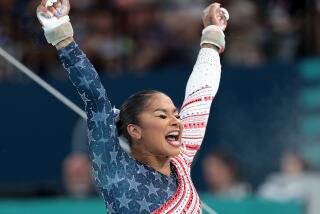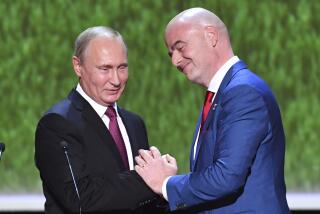FIFA Doping Rules at Issue
- Share via
The world’s top sports tribunal ruled Monday that the anti-doping rules of soccer’s international governing body don’t jibe with the World Anti-Doping Code, a decision that ratchets up pressure on FIFA just weeks before this summer’s World Cup and could ultimately threaten soccer’s standing in the Olympics.
The opinion, issued by the Swiss-based Court of Arbitration for Sport, is “advisory” and not binding on FIFA, which governs world soccer and for months has claimed that it, not the World Anti-Doping Agency and the world code, ought to control soccer’s anti-doping protocols.
Any sport that doesn’t conform to the world code, which took effect in 2004 and has been adopted by dozens of international sports federations and governments worldwide, runs the risk of being removed from the Olympic program.
Montreal-based WADA said in a statement it “welcomed” the ruling “with satisfaction.”
FIFA, in a statement from its Swiss headquarters, said that the ruling had shown its rules were “to the greatest extent possible” in line with the world code. FIFA President Joseph “Sepp” Blatter added that the opinion had also “laid the foundation for resolving any differences.”
“It sounds to me like a Vietnam victory: They’re declaring success and pulling out,” Dick Pound, WADA chairman, said in a phone call with reporters.
The dispute between FIFA and WADA has drawn scant attention in the U.S. but elsewhere has been watched with anticipation, because of soccer’s leading role in many countries and because a decision strongly in favor of FIFA would have been seen as an erosion of WADA’s authority.
At issue is the appropriate penalty for a doping violation.
The World Anti-Doping Code calls for a two-year ban. FIFA’s rules call for a suspension of six months to two years.
The three-member CAS panel said it is “well aware” that a two-year suspension, even for a first offense may amount to a “very harsh punishment.” However, it said it “shares the view of ... WADA and most international [sports] federations that it is the two years’ ineligibility only which constitutes a credible deterrent against doping.”
More to Read
Go beyond the scoreboard
Get the latest on L.A.'s teams in the daily Sports Report newsletter.
You may occasionally receive promotional content from the Los Angeles Times.






